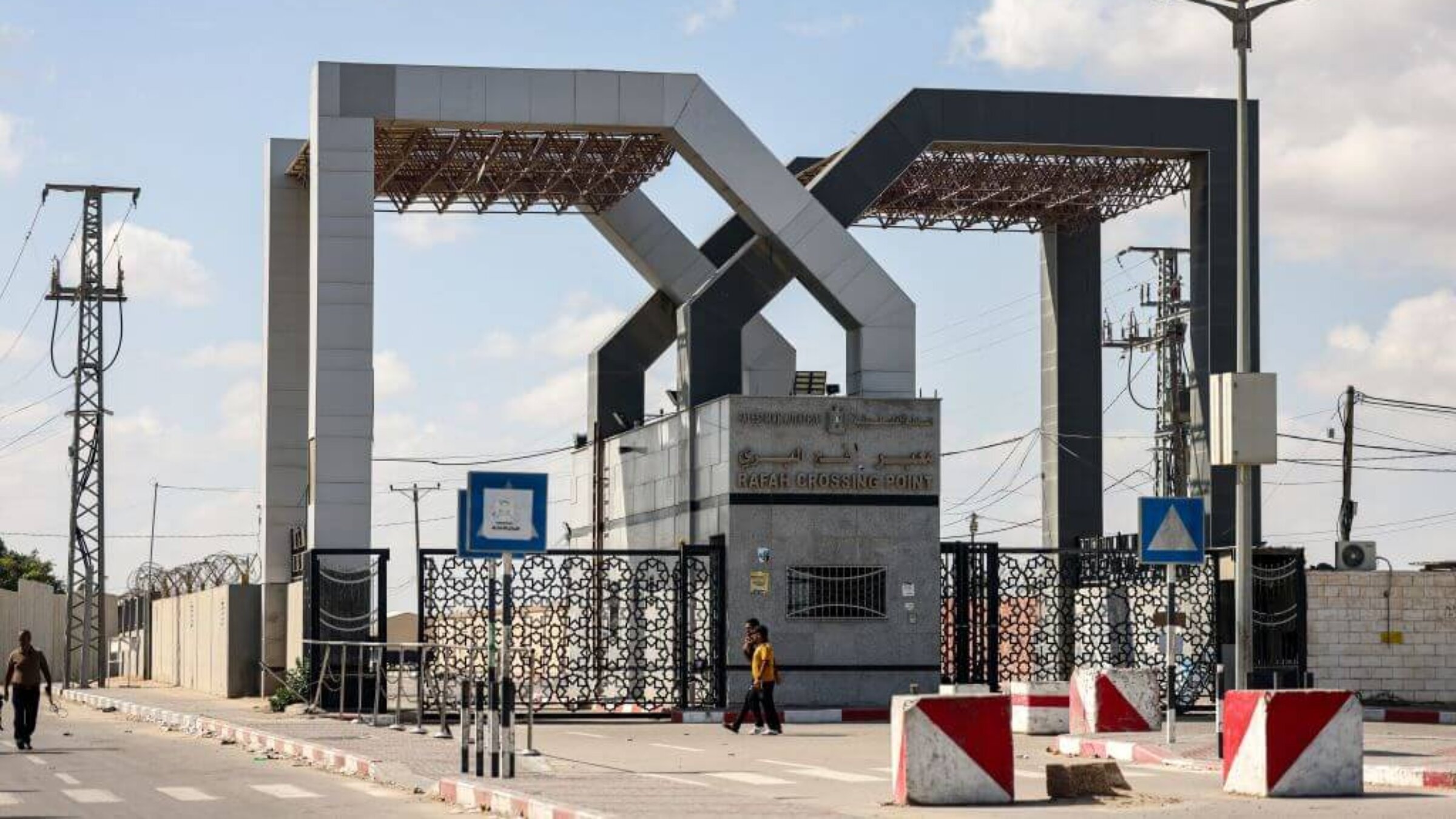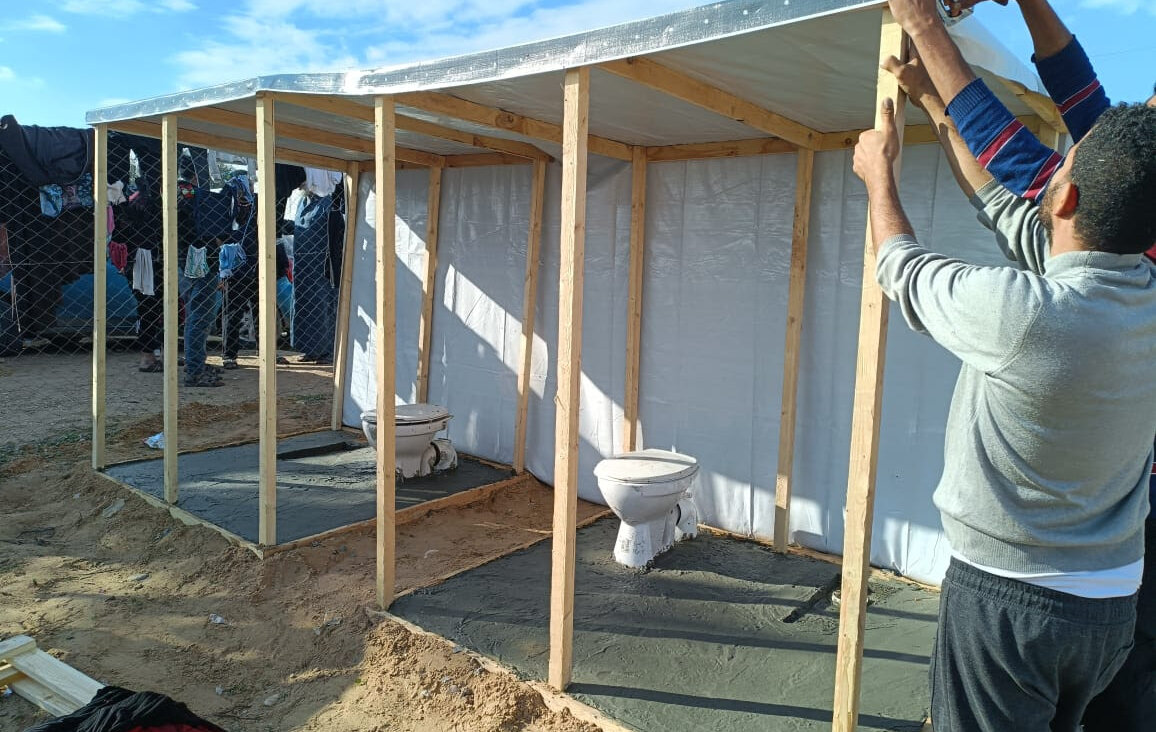‘I’m OK now’: How journalism helped one Gaza woman escape the war
With the generous help of Forward readers, Yasmine Ayyoub and her husband made it to Egypt

As of early February, Egyptian officials have estimated that upwards of 35,000 people have left Gaza through the Rafah border crossing, including those in need of medical treatment. Photo by MOHAMMED ABED/AFP via Getty Images
The day Yasmine Ayyoub learned that she and her husband would be allowed to escape the brutal war in Gaza, she felt empty.
It had been three months since Ayyoub, a 30-year-old psychologist who specializes in children’s trauma, made the wrenching decision to leave the coastal enclave where she has spent her entire life — and, with it, her parents, in-laws, siblings, nieces and nephews. Thanks largely to donations from readers of this newsletter, she had paid an Egyptian company $10,000 in mid-February for permits and passage through Gaza’s Rafah border.
Every evening for weeks, she and her husband had been checking to see if theirs were among 300-some names on the company’s list posted online for exit the next morning. Finally, last Friday at 7 p.m., they were. Twelve hours later, the couple boarded a bus for Cairo, each with a single bag of basics: a couple of outfits, money, the cloth toy beloved by their baby, Sophia, who was born with incomplete organs and died last summer after 10 months of struggle.
The departure was made more difficult by the fact that two of Ayyoub’s nephews, brothers aged 18 and 21, were killed a few days before by an artillery shell near Al Shifa Hospital in Gaza City.
“I felt nothing,” Ayyoub told me when we spoke this week via video chat. “My hope — I had lost my motivation to travel. I felt sad to leave our families in Gaza. I didn’t see my mom and dad, it is too hard for me. We cried so much.”
This is what counts as a happy story in Gaza these days.
Yasmine is the youngest of nine siblings of Abeer Ayyoub, a local Gaza journalist I worked with a dozen years ago when I was the Jerusalem bureau chief of The New York Times. Abeer, who left Gaza in 2016 and now lives in Istanbul, reached out to me on Christmas Eve seeking help for Yasmine, who was among at least a thousand Palestinians in Gaza who’d started GoFundMe campaigns in hopes of fleeing the war.
Yasmine’s page said she needed $39,240 and included a detailed budget including GoFundMe’s transaction fees. She had 48 donations totaling $2,906 when I wrote about her quest on Jan. 19. More than 200 readers responded with contributions totaling about $13,000, many in multiples of $18, which represents the Hebrew word for life, chai.
“Per Jodi Rudoren‘s request & in memory of those who did the same for my ancestors,” someone named Morgan Schaengold, who gave $500, wrote on the site. “Hoping this helps your family find some safety and that someday you and your children are able to return to your sanctuary.”
Don Katz gave $900. “I’m doing what I can to help those caught in the middle of this horrible war,” he said.
Donna Chazanov, $36: “Hoping for compassion, tolerance, and respect among nations and religions.” Rachel Lavine, $250: “Praying for your safety.” Myrna Greenfield, $36: “Too much blood, too much hate.”
Cynthia Barr, $72: “Wishing safety and peace for you and your loved ones, and for everyone caught up in this tragedy.”
“Impact” is a big buzzword in journalism circles. Usually, it refers to investigative stories that lead to a corrupt politician’s ouster or some change in public policy. Sometimes it’s harder to measure: raising awareness of some societal problem or sparking a conversation that some community really needed to have.

It is a rare privilege to be able to see the impact of your work on the screen of your phone, in a face newly calm, in eyes with the hint of a twinkle; to hear its voice of deep and straightforward gratitude. “I’m OK now, alhamdulillah,” Ayyoub said, using the Arabic word that means “praise be to God.”
Rafah is about 320 kilometers from Cairo. It’s normally a five-hour drive, but Ayyoub said their caravan of buses did not arrive until 11 p.m. Saturday night, after crossing through four checkpoints and other delays. It’s Ramadan, so many on the journey, including Yasmine’s husband, Mohammad Ghanem, were fasting (Yasmine was on her period, and thus exempt).
Along the way, a child exulted upon seeing a banana in a roadside market — it had been months since they’d seen the fruit inside Gaza. “We were all laughing,” Ayyoub recalled. “This is hard for us.”
Abeer, the older sister, had come to Cairo a week earlier with her 4-year-old daughter, Juju, and awaited Yasmine at an Airbnb. “She plays with Juju a lot,” Abeer told me. “Since she arrived, Juju, I don’t know why, she is very attached to Yasmine. ‘Mama, I want to sleep with Yasmine and not with you.’”
They spent the first few days shopping — for pajamas and clothes, for a laptop to replace the one Ghanem, who works remotely in customer service, left behind months ago when the couple first fled Gaza City. On Wednesday, they found an apartment to rent for $600 a month.
“We know hundreds of Palestinians from Gaza who came before her, so we were trying to get in touch with them to see where we should rent,” Abeer explained. “They all live in a compound. You can say that we have a community of people who evacuated, who left Gaza because of the war.”
I tried in vain to get a good estimate of how many people have left Gaza since the war began. News organizations and human-rights groups do not seem to be tracking it. In early February, The Times of Israel quoted Egyptian officials saying 35,000 had crossed through Rafah. Abeer said the company Yasmine used has taken about 300 people out each day for the past 90 days, and that they are one of several such companies, charging 10 times the amount for passage as was typical before the war.
“Cairo is the only destination that can take people,” Abeer told me. “You cannot make a visa to Turkey, you cannot go to Dubai because they no longer accept Palestinians. Jordan the same.”
Yasmine said she has been “surprised by the atmosphere” in Cairo, where Egyptians seem to be going about life as normal despite the war raging next door. “They are OK, but we are not OK in Gaza. They live their life as if nothing is happening in Gaza.”
Each night, the sisters connect with relatives back home, sending pictures of the food they have prepared for iftar, the evening meal that ends each day’s fast during the holy month of Ramadan.
“I think she is very overwhelmed,” Abeer said of Yasmine. “She is happy she survived, she is sad the rest of the family is in Gaza. She is so confused about whether they will go back to Gaza or they will look for a new opportunity.
“I told her you have to forget about planning for the future, you are in a transition period, as if you are coming for a vacation,” she continued. “I tell her, at least you are safe.”






















